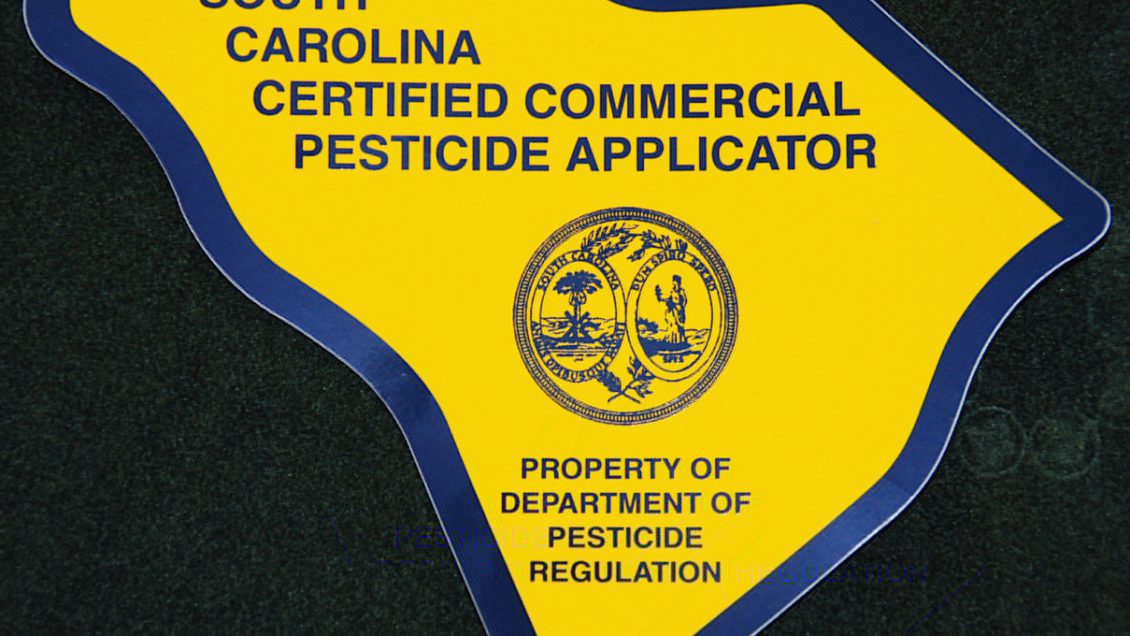
CLEMSON — State officials have adopted an emergency regulation that will give pesticide applicators in South Carolina the opportunity to extend renewal of their operating licenses until the end of the year.
The Department of Pesticide Regulation (DPR), a state regulatory agency and part of Clemson University Public Service and Agriculture, made the postponement in response to the COVID-19 outbreak and issued new guidelines for testing, certification and licensure of commercial, non-commercial or private applicators of regulated pesticides.
All S.C. pesticide applicators who were licensed as of Dec. 31, 2019 but have not already renewed as of April 1, 2020, will have their licenses extended through Dec. 31, 2020 if they meet specific requirements.
Applicators must:
- Complete a Clemson DPR-approved, on-line, two-hour training program during the year.
- Pay the annual license fee as required by law.
- Be subject to a pesticide applicator inspection.
“We recognize that it is essential to maintain both commercial and private pesticide use in public health, agriculture and related areas. These temporary changes were needed in light of the COVID-19 pandemic,” said Steve Cole, director of Clemson’s Regulatory Services unit, of which DPR is a part. “We’re doing our best to see that, despite the changes the outbreak has brought to our country, pesticide applicators are able to continue serving their vital function.”
Renewal, training and testing for 2021 is expected to resume as usual. Up-to-date information will be made available on the DPR website: https://www.clemson.edu/public/regulatory/pesticide-regulation/
Additionally, guidelines under the emergency regulation also include:
- All in-person applicator certification exam requirements are suspended.
- On-line testing is still valid, however, most on-line testing centers in South Carolina have closed. The Metro Institute will update the availability of the testing centers. The Metro Institute can be reached online at https://www.metrosignup.com/home.asp

Pesticide licensing ensures that the pest-control professional has passed a qualifying examination evaluating the applicator’s knowledge about using pesticides safely and that the applicator carries adequate liability insurance to cover mishaps that may occur due to the pest-control activities. Nothing in this temporary guidance shall exempt any applicator from complying with all other existing requirements. Specifically, any applicators using or supervising the use of Restricted Use Pesticides during 2020 must be certified and licensed. The U.S. Environmental Protection Agency has not modified this requirement.
- Similarly, any applicator using or supervising the use of pesticides while performing pest control activities as outlined in Section 27-1085 (L) of the Rules and Regulations for the Enforcement of the South Carolina Pesticide Control Act during 2020 must be certified and licensed. These activities include Aquatic, Turf and Ornamental, Structural and Public Health. The Clemson University Department of Pesticide Regulation has not modified this requirement.
The changes are being implemented immediately and will remain in effect until further notice. Any changes or updates to these measures will be posted online at the DPR website.
The emergency regulation was adopted under the auspices of Gov. Henry McMaster’s Executive Order 2020-08 declaring a state of emergency in South Carolina on March 13.
Pesticide regulation is mandated by the federal government and each state’s designated agency is responsible for enforcing pesticide regulations in that state. In South Carolina, DPR works with the U.S. Environmental Protection Agency to make sure pesticides are used in a lawful manner that minimizes risk to the environment and human health.
The department certifies and licenses individuals, professionals and businesses through state and federal laws and its investigators across the state conduct routine and for-cause inspections on pesticide use and alleged misuse.
DPR is part of the Division of Regulatory Services which is housed within Clemson University Public Service and Agriculture. Including DPR and similar offices for plant industry, fertilizer and seed, Regulatory Services partners with other state and federal agencies like the S.C. Department of Agriculture and Clemson Cooperative Extension to provide regulation through education.
END
Get in touch and we will connect you with the author or another expert.
Or email us at news@clemson.edu


